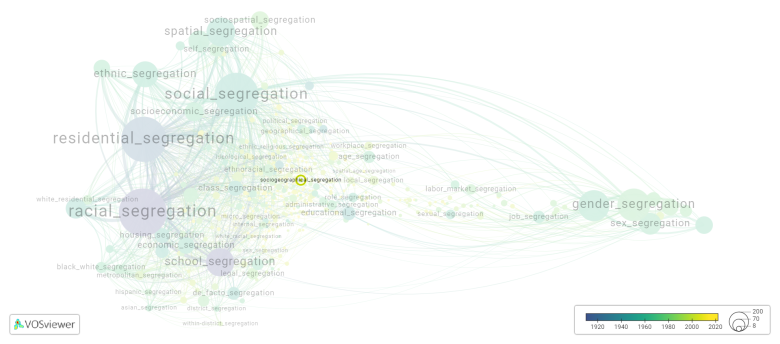Sociogeographical segregation
Date and country of first publication[1]
2012
United States
Definition
Socio-geographic segregation refers to the separation and clustering of individuals or groups based on their social or economic characteristics in specific geographic areas. This can occur through various means, such as income inequality, access to resources, educational opportunities, and discrimination. Socio-geographic segregation can lead to the creation of divided communities with limited social interactions and opportunities for social mobility. It can also contribute to the perpetuation of inequalities and disparities among different populations. Addressing socio-geographic segregation requires comprehensive efforts to promote inclusive and equitable development, affordable housing, access to quality education, and opportunities for social integration.
See also
Related segregation forms
Sociogeographical segregation is frequently discussed in the literature with the following segregation forms:
This visualization is based on the study The Multidisciplinary Landscape of Segregation Research.
For the complete network of interrelated segregation forms, please refer to:
References
Notes
- ↑ Date and country of first publication as informed by the Scopus database (December 2023).
At its current state, this definition has been generated by a Large Language Model (LLM) so far without review by an independent researcher or a member of the curating team of segregation experts that keep the Segregation Wiki online. While we strive for accuracy, we cannot guarantee its reliability, completeness and timeliness. Please use this content with caution and verify information as needed. Also, feel free to improve on the definition as you see fit, including the use of references and other informational resources. We value your input in enhancing the quality and accuracy of the definitions of segregation forms collectively offered in the Segregation Wiki ©.
Sociogeographical segregation appears in the following literature
Stewart C.M. (2012). Mapping language ideologies in multi ethnic urban Europe: The case of Parisian French. Journal of Multilingual and Multicultural Development, 33(2), 187-202. https://doi.org/10.1080/01434632.2011.617821
Maya-Jariego I., Peña-Leiva A.D.L., Arenas-Rivera C., Alieva D. (2019). Personal networks, social media, and community cohesion in the strategies of peace building agents in Colombia to counteract the segregation of displaced populations. Journal of Community Psychology, 47(6), 1300-1312. Wiley-Liss Inc..https://doi.org/10.1002/jcop.22173

